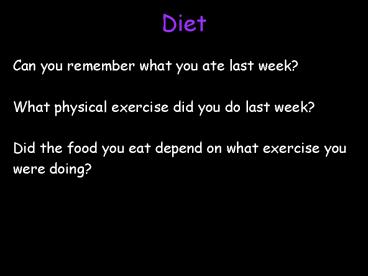Diet
1 / 12
Title: Diet
1
Diet
- Can you remember what you ate last week?
- What physical exercise did you do last week?
- Did the food you eat depend on what exercise you
- were doing?
2
Diet andPhysical Activity
- We all need to follow a balanced diet.
- Sports performers need to consider their diet
very carefully. - Different activities need different diets and so
do individuals themselves. - What needs to be taken into account?
- Age
- Amount type of activity undertaken
3
Age
- Younger people rapid growth spurts, need
greater amount of food for the body. - Growing older food intake needs to be regulated
as weight gain more likely (due to less exercise)
4
Amount and type of exercise taken
- Different activities have different demands and
- dietary requirements, which is which?
Need great deal of body weight Carbs fats a
priority to increase their bulk Extra proteins to
help muscle development
Gymnasts
Need to be small light Avoid fatty foods (
body weight) Good balance of carbohydrates,
proteins fats
Hockey players
Need energy to keep them going Body weight not
major concern Normal diet with enough carbs
proteins
Weightlifters
5
Dietary needs
- Performers also need to pay attention to
- their dietary needs at certain times
- Before activity
- During activity
- After activity
6
- Before activity
- Period of preparation where performers must make
sure the are as ready as they can be to take
part. - If their activity needs them to be very light or
large it has to be planned well in advance
maintained over quite a long period of time. - Becomes the norm after a period of time.
- Carbohydrate loading
- Top marathon runners adjust their diet about a
week before an event. - They decrease the amount of carbs at the start
then increase it just before the event
(especially the night before).
7
NOTE The timing of this is important. It can be
dangerous to eat within 2 hours of an event
because the body finds it hard to digest the
food, as well as meeting the demands that the
increased amount of exercise makes. Especially
fats and meat. Liquids can be taken just before
without causing problems (not alcohol!!).
8
- During activity
- No food should be taken during activity because
the digestive system would not cope and could
cause extreme pain or illness. - Lost fluids should be replaced to prevent
dehydration - After activity
- When activity is over you must replace all energy
thats been used up. - Must not be done straight away, except liquid.
- At least 2 hours should be left before
substantial food is eaten. - Cycle of eating, following correct diet, can
start again, for next performance.
9
Possible dietary problems..
- Being underweight can be just as unhealthy as
being overweight. - In some cases a person may be anorexic a mental
illness where someone refuses to eat. - May also become bulimic a normal diet but then
a person forces themselves to be sick. - Can lead to death.
10
- Obesity
- Opposite condition
- Being extremely fat overweight can also be very
dangerous. - Puts strain on the heart, joints muscles.
11
Where are you?
12
- Questions
- 1. Compare 2 different performers in 2 different
activities and describe the dietary requirements
of each. - 2. Why is it important for sports performers to
maintain fluid levels? - Carbs are one type of substance which makes up a
balanced diet. Name 2 others. - Describe what carbohydrate loading is and explain
why a performer might choose to do it. - Anorexia would have a major negative effect on a
sportsperson to perform. Explain 2 ways it would
have an effect.































